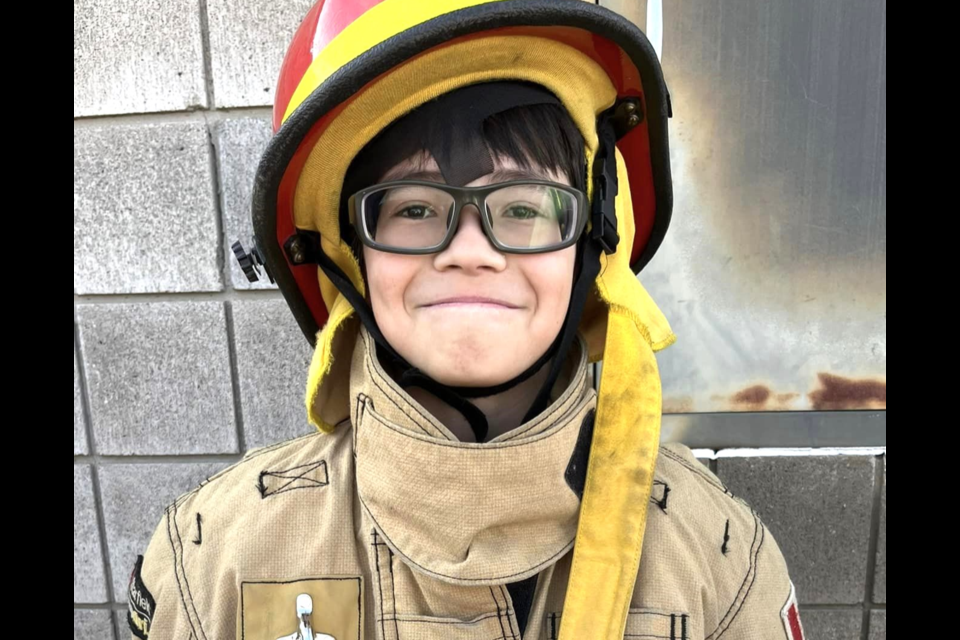MOOSE JAW — Fire Prevention Week ran from Oct. 6 to 12 and the Moose Jaw Fire Department (MJFD) once again teamed up with the National Fire Protection Association (NFPA) to promote a week of safety and education in the city.
To mark the occasion, the MJFD hosted a two-day program at the South Hill Fire Hall where students from grades six to eight had the chance to tour the station and learn about fire safety on Oct. 8 and 9.
This year’s theme was “Smoke alarms: Make them work for you,” announced Cathie Bassett, the MJFD’s public education officer.
Fire Prevention Week always begins Oct. 9 to commemorate The Great Chicago Fire of 1871 that killed approximately 300 people, destroyed over 17,000 structures, and left more than 100,000 residents homeless.
This year’s campaign focused on educating residents about smoke alarm systems. According to the NFPA, a working smoke alarm reduces the risk of death in a house fire by more than 54 per cent. Approximately three out of five fire deaths occur in homes that either have no smoke alarms or have smoke alarms that are not working.
“Smoke alarms serve as the first line of defence in a home fire, but they need to be working in order to protect people,” advised Lorraine Carli, vice president of outreach and advocacy at NFPA.
Tours of the fire station involved students from St. Mary, King George, and Palliser Heights schools on Oct. 8 and students from St. Michael and St. Agnes schools on Oct. 9.
“We had two days of full tours for the kids this year… and we invited students from grades six to eight because we think that those kids don’t always end up getting out for good field trips…,” Bassett said.
“Last year we saw what a success (the program) was, so we did it again this year. This year we invited five schools and we had 420 students in two days, so it was pretty busy,” she added.
Focusing on this age group is important, she said, because many of these students are starting to cook at home and they’re on their way to becoming young adults who are becoming increasingly more independent.
During the tour students had the opportunity to don firefighting gear — minus the heavy tanks and masks of course — and learned about the equipment used by firefighters, learned how to conduct a right-hand search through a building, and even got to test out the fire hose in addition to learning life-saving tips along the way.
New this year was an introduction to the station’s smoke house where Moose Jaw’s firefighters undergo training in heavy smoke scenarios. “And boy that was a hit, because they really got to see how bad it gets in a house when there’s smoke in it,” she said. “It was a really great day and (we had) a lot of smiling faces.”
Bassett said she cannot stress the importance of smoke alarms enough. “If (you) don’t have working smoke alarms in the home, (you’re) not going to get the warning soon enough,” she advised. “Smoke alarms aren’t expensive, and it drives me crazy in this day and age that people still don’t have working smoke alarms in their home when there’s no reason for it.” This one simple decision could potentially save the life of you and your family.
Smoke alarm safety tips
The MJFD offered some smoke alarm safety tips:
- Smoke alarms should be installed in every bedroom, outside of each separate sleeping area such as hallway spaces, and on each level of the home including the basement.
- Always follow the manufacturer's instructions and place smoke detectors strategically. Avoid areas that cause “nuisance alarms” such as a spot above the stove or too close to the shower as many residents tend to get annoyed and remove the batteries or become complacent.
- Make sure that all smoke alarms meet the needs of all family members, including those with sensory or physical disabilities.
- Smoke alarms should be tested at least once each month by pressing the “test” button.
- Replace your smoke alarm every 10 years.
- During spring and fall cleaning it’s a good idea to vacuum your smoke detectors as they’re prone to collecting dust similar to any other electronic device. Heavy dust contamination can limit the smoke alarm’s ability to detect smoke particles.
For more information about Fire Prevention Week and smoke alarm safety, visit FPW.org or visit Sparky.org for children’s fire safety tips. You can also visit the MJFD’s Facebook page, ‘Moose Jaw Fire Department — Official’ to learn more about the work done by Moose Jaw’s firefighters.




